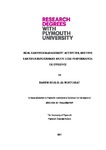REAL EARNINGS MANAGEMENT ACTIVITIES, MEETING EARNINGS BENCHMARKS AND FUTURE PERFORMANCE: UK EVIDENCE
| dc.contributor.supervisor | Nawaz, Tasawar | |
| dc.contributor.author | Al-shattarat, Basiem | |
| dc.contributor.other | Plymouth Business School | en_US |
| dc.date.accessioned | 2017-03-01T09:14:18Z | |
| dc.date.issued | 2017 | |
| dc.identifier | 10543187 | en_US |
| dc.identifier.uri | http://hdl.handle.net/10026.1/8571 | |
| dc.description.abstract |
This thesis presents two essays on real earnings management and future performance. The first essay draws on empirical studies that examine the three types of real earnings management activities in the United Kingdom (UK) for firms that are more likely to manipulate their earnings to avoid missing earnings targets. These targets include the zero earnings, and last year’s earnings. Also drawing from empirical studies, the second essay investigates the impact of real earnings management on firms’ future operating performance in the UK. In the first essay, I examine earnings management through real activities manipulation by using a sample of UK firms over the period 2009-2013. According to the transaction cost theory and opportunistic perspective of earnings management, the results of the first essay reveal that managers in UK suspect firm-years that manage earnings upward utilise more real earnings management activities to achieve earnings benchmarks opportunistically. Specifically, I find that (1) firms which manage upward earnings have unusually low cash flows from operations by offering price discounts or/and more lenient credit terms to increase sales; (2) firms that manage upward earnings have unusually low discretionary expenditures by cutting/reducing expenditures spending to improve reported margin and (3) firms which manage upward earnings, incur unusually high production costs by producing more products to report lower costs of goods sold in order to achieve their targets. Further, I find evidence that UK firms’ meeting/beating earnings benchmarks around zero earnings and last year’s earnings engage in sales-based manipulation and reducing/cutting discretionary expenses simultaneously; they also engage in overproducing products and reducing discretionary expenses at the same time. Furthermore, I do not find, however, evidence that managers in UK firms are associated with high real earnings management through sales-based manipulation to meet/beat last year’s earnings. On the other hand, I find evidence that manager in UK firms engage in income-increasing earnings management through accounting choice (e.g., accrual-based earnings management) to meet an earnings target. Motivated by agency conflicts of real earnings management (e.g., opportunistic and signalling perspectives), the second essay investigates whether there is an association between UK firms that manipulate their business operations to meet earnings benchmarks (e.g., zero earnings, last year’s earnings) and subsequent operating performance. I implement Fama and MacBeth’s (1973) regression analysis to examine the effects of the magnitude of real earnings management on firms’ future performance. Empirical test results show that manipulation of operating activities such as sales, discretionary expenditures, and production costs to meet earnings benchmarks has a significant positive consequence for firms’ subsequent operating performance and signals firms’ good future performance. Further, I find evidence that firms that manipulate their operating activities in the absence of meeting/beating earnings benchmarks experience a decline in their subsequent operating performance. The findings of this research lend support to our understanding of the process that management follows to evaluate costs and benefits of real earnings management. | en_US |
| dc.language.iso | en | |
| dc.publisher | University of Plymouth | |
| dc.subject | Earnings Management | en_US |
| dc.subject | Real Earnings Management | en_US |
| dc.subject | Accrual Earnings Management | en_US |
| dc.subject | Earnings Benchmarks | en_US |
| dc.subject | Future Performance | en_US |
| dc.subject.classification | PhD | en_US |
| dc.title | REAL EARNINGS MANAGEMENT ACTIVITIES, MEETING EARNINGS BENCHMARKS AND FUTURE PERFORMANCE: UK EVIDENCE | en_US |
| dc.type | Thesis | |
| plymouth.version | publishable | en_US |
| dc.identifier.doi | http://dx.doi.org/10.24382/665 | |
| dc.identifier.doi | http://dx.doi.org/10.24382/665 | |
| dc.rights.embargodate | 2018-03-01T09:14:18Z | |
| dc.rights.embargoperiod | 12 months | en_US |
| dc.type.qualification | Doctorate | en_US |
| rioxxterms.version | NA |
Files in this item
This item appears in the following Collection(s)
-
01 Research Theses Main Collection
Research Theses Main


